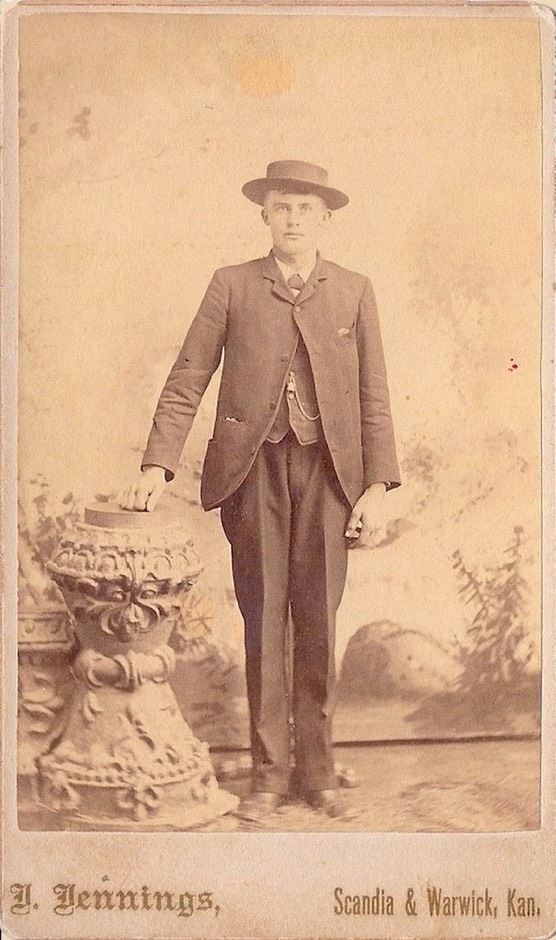
The death of Simpson Grant Lovewell in 1952 was a memorable event in the family saga, one that called for a unique obituary. Simpson Grant was the last of Thomas and Orel Jane Lovewell's children to be born while White Rock was still the epicenter of Indian troubles in Kansas, and also the last one born before a great flood of settlers streamed into Jewell and Republic counties. The job of writing his obituary, which bears the byline, “A Tribute by a Niece,” must have been handed to family historian Orel Poole, whose fingerprints are all over it.
Now seems the perfect time to share selections from that obituary, which not only ties familiar historical details to Simpson Grant's personal story but also brings up friends of the family who were mentioned in my most recent posting, “Proximity." To seal the matter, a letter arrived today from Dave Lovewell containing a stylish picture of 14-year-old Simpson Grant Lovewell.
The picture-taking session in one of Joseph Jennings’ portrait galleries, might have been arranged to commemorate Grant’s graduation from White Rock School in 1893. His confident pose recalls his father’s stance in the Pike’s Peak photograph taken three decades earlier. 1893 was also the year when 67-year-old Thomas Lovewell posed for a photograph along with his newly-rediscovered daughter at another Jennings gallery, supposedly one in Courtland.
Grant Lovewell at 14
No, he’s not getting his outfit together to go trick-or-treating as Zorro. The occasion for the photograph was probably Grant’s graduation from the eighth grade, which was as far as you could go in Sinclair Township’s educational system, until a high school was built a few decades later.
Along with the photo of his grand-uncle, Dave Lovewell dropped a note expressing some surprise that little Warwick was ever home to a photographic studio.
All that remains of the town today, he writes, is a huge chunk of concrete which the present owner prefers to farm around, rather than pay someone to doze it out.
“Probably a wise decision,” according to Dave.
Simpson Grant Lovewell, eldest son of Thomas and Orel Jane Lovewell, pioneers of 1865, was born January 23, 1869, and departed this life June 11, 1952 at the Brodstone hospital, Superior, Neb., at the age of 83 years 4 months, and 10 days. Grant was born at the home of his maternal grandmother, Mrs. William Scott, Clyde, Kan.
Mrs. Lovewell and small daughter were spending the winter there as the White Rock settlement had withdrawn from the valley due to an Indian uprising. Only Thomas Lovewell and Adam Rosenburg remained. The settlement had become alarmed after the “Ward Massacre” in April, and the “Gordon Winbigler” killing on the White Rock in August, 1868. Many never returned, a few brave hearted ones came back as did Mrs. Lovewell with her infant son and daughter, Josephene. That spring a wave of immigrants came again taking up where others had left.
Here Grant grew to manhood, attending school in the rock school house his father helped build from native rock.
Mrs. John Doxon was one of his teachers and remained a friend of the family all her life. Her daughter, Kate, also remained in the family circle of friends and has given invaluable aid in caring for him during his lingering illness.
Grant many times had the responsibilities of the homestead as his father was often away due to land and mining interests in the west. In later years he accompanied his father on several of his trips to the western states.
Orel Poole closed the tribute to her uncle with a short poem:
A great oak has fallen to the sickle of Time A strong and upright man was he in his prime. He played where Indians and buffalo roamed. And followed the furrow of the upturned sod, To make this an abundant valley by the grace of God.
One passage in Orel Poole’s obituary for her uncle might escape notice as an unremarkable aside, if we didn’t know about one of Simpson Grant’s peculiarities, the one dealt with in “Two by Two.” When we read Orel Pool's words, “His pride was in his home and farm, which he kept with great care …” we wonder if those in the know smiled at a gentle reference to her uncle’s quirky insistence on symmetry, a condition which today might be assigned the bland diagnosis, “OCD.” Some prefer to think that he was simply a balanced man.